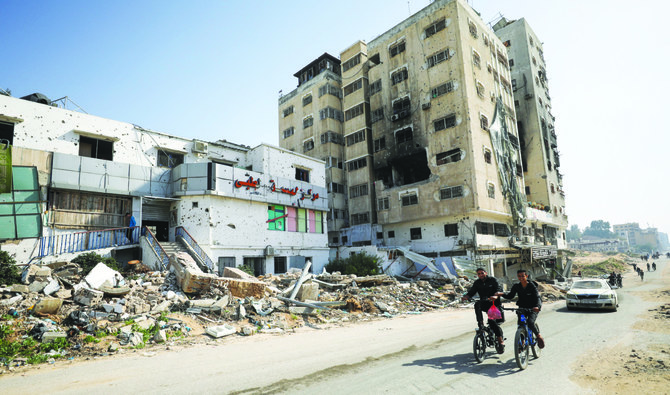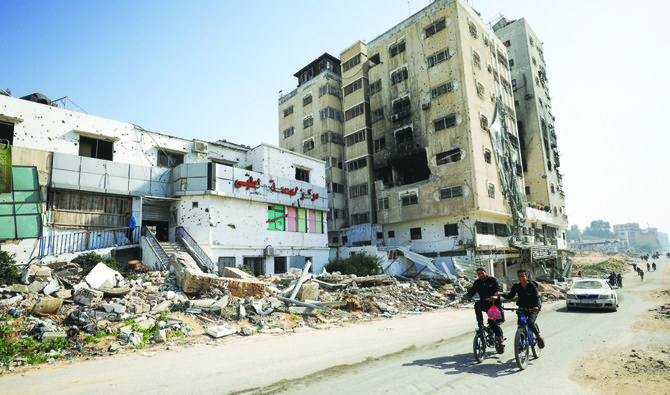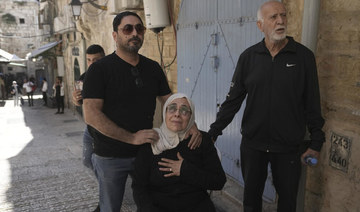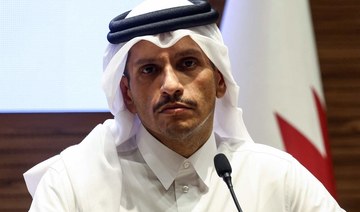GAZA: When an Israeli shell struck Gaza’s largest fertility clinic in December, the explosion blasted the lids off five liquid nitrogen tanks stored in a corner of the embryology unit.
As the ultra-cold liquid evaporated, the temperature inside the tanks rose, destroying more than 4,000 embryos plus 1,000 more specimens of sperm and unfertilized eggs stored at Gaza City’s Al Basma IVF Center.
The impact of that single explosion was far-reaching — an example of the unseen toll Israel’s six-and-a-half-month-old assault has had on the 2.3 million people of Gaza.
The embryos in those tanks were the last hope for hundreds of Palestinian couples facing infertility.
“We know deeply what these 5,000 lives, or potential lives, meant for the parents, either for the future or for the past,” said Bahaeldeen Ghalayini, 73, the Cambridge-trained obstetrician and gynecologist who established the clinic in 1997.
At least half of the couples — those who can no longer produce sperm or eggs to make viable embryos — will not have another chance to get pregnant, he said.
“My heart is divided into a million pieces,” he said.
Asked on Wednesday about the incident, the Israeli military’s press desk said it was looking into the reports. Israel denies intentionally targeting civilian infrastructure and has accused Hamas fighters of operating from medical facilities, which Hamas denies.
Three years of fertility treatment was a psychological roller coaster for Seba Jaafarawi. The retrieval of eggs from her ovaries was painful, the hormone injections had strong side-effects and the sadness when two attempted pregnancies failed seemed unbearable.
Jaafarawi, 32, and her husband could not get pregnant naturally and turned to in vitro fertilization, which is widely available in Gaza.
Large families are common in the enclave, where nearly half the population is under 18 and the fertility rate is high at 3.38 births per woman, according to the Palestinian Bureau of Statistics. Britain’s fertility rate is 1.63 births per woman.
Despite Gaza’s poverty, couples facing infertility pursue IVF, some selling TVs and jewelry to pay the fees, Al Ghalayini said.
At least nine clinics in Gaza performed IVF, where eggs are collected from a woman’s ovaries and fertilized by sperm in a lab. The fertilized eggs, called embryos, are often frozen until the optimal time for transfer to a woman’s uterus. Most frozen embryos in Gaza were stored at the Al Basma center.
In September, Jaafarawi became pregnant, her first successful IVF attempt.
“I did not even have time to celebrate the news,” she said.
Two days before her first scheduled ultrasound scan, Hamas launched the Oct. 7 attack on Israel, killing 1,200 people and taking 253 hostages, according to Israeli tallies.
Israel vowed to destroy Hamas and launched an all-out assault that has since killed more than 33,000 Palestinians, according to Gaza health authorities.
Jaafarawi worried: “How would I complete my pregnancy? What would happen to me and what would happen to the ones inside my womb?“
Her ultrasound never happened and Ghalayini closed his clinic, where an additional five of Jaafarawi’s embryos were stored.
As the Israeli attacks intensified, Mohammed Ajjour, Al Basma’s chief embryologist, started to worry about liquid nitrogen levels in the five specimen tanks. Top ups were needed every month or so to keep the temperature below -180C in each tank, which operate independent of electricity.
After the war began, Ajjour managed to procure one delivery of liquid nitrogen, but Israel cut electricity and fuel to Gaza, and most suppliers closed.
At the end of October, Israeli tanks rolled into Gaza and soldiers closed in on the streets around the IVF center. It became too dangerous for Ajjour to check the tanks.
Jaafarawi knew she should rest to keep her fragile pregnancy safe, but hazards were everywhere: she climbed six flights of stairs to her apartment because the elevator stopped working; A bomb leveled the building next door and blasted out windows in her flat; food and water became scarce.
Instead of resting, she worried.
“I got very scared and there were signs that I would lose (the pregnancy),” she said.
Jaafarawi bled a little bit after she and her husband left home and moved south to Khan Younis. The bleeding subsided, but her fear did not.
They crossed into Egypt on Nov. 12 and in Cairo, her first ultrasound showed she was pregnant with twins and they were alive.
But after a few days, she experienced painful cramps, bleeding and a sudden shift in her belly. She made it to hospital, but the miscarriage had already begun.

















